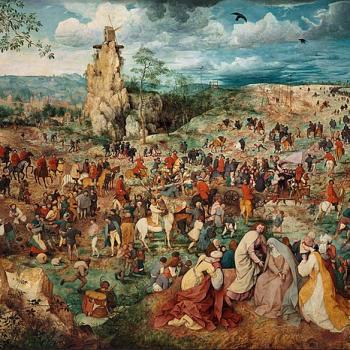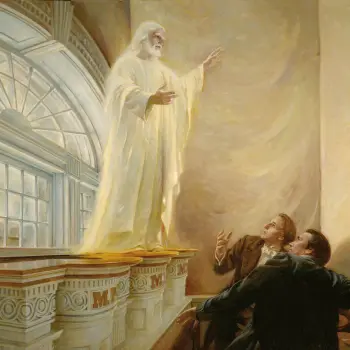
(Wikimedia Commons public domain photograph)
We’re again approaching the wonderful season of Christmas. Here in Australia, people are gearing up and decorations are going up for this major summer holiday.
I think it appropriate — not least, to get myself into the right mood — to dust off some older Christmas-related newspaper columns. Here’s one, for example, that I published in the Deseret News on 9 December 2010:
I often wonder which of the two holidays, Christmas or Easter, is the most theologically significant. Occasionally, I’m repelled not only by the commercialism of modern Christmas but by its sentimentality. It’s too easy, sometimes, to gush about the “babe of Bethlehem.”
Babies are cute. They’re funny. They’re unthreatening. And, although they certainly make demands upon their parents (often in the middle of the night), they don’t require our total obedience. Anyway, billions of babies have been born. Scores of millions are born every year. Roughly four are born every second, worldwide. The birth of a baby may well be a miracle, in a sense, but it’s an extremely common one. Nonbelievers and non-Christians can, and often do, enthusiastically celebrate Christmas.
Easter remains the more religiously serious holiday. Perhaps that’s why, Easter eggs and Easter chocolate and Easter dresses notwithstanding, it’s been more difficult to commercialize. And it’s harder for nonbelievers to join in the festivities. To celebrate the birth of a baby is one thing; to celebrate the resurrection of an executed man is quite another. If it weren’t for Easter, if it weren’t for belief in the Atonement and Resurrection of Christ, there would be no particular reason to celebrate Christmas.
But the central claim of Christmas isn’t merely that a baby was born. It’s that this particular newborn was, in fact, the perfect Son of God, the creator of the universe, our Lord and Savior. From this perspective, Christmas is the more fundamental holiday: no Christmas, no Easter.
I probably can’t resolve the question. And there is, perhaps, no need to resolve it. Both holidays commemorate essential parts of the divine plan for our salvation. But this much is indisputably true: that God took upon himself our weaknesses, our flesh — and, ultimately, our sins — is the central proposition that separates almost all forms of Christianity from all other religions. They’re close cousins to the Christian faith, but neither Judaism nor Islam represents God as coming down to earth, “suffering pains and afflictions and temptations of every kind … that he may know according to the flesh how to succor his people according to their infirmities” (Alma 7:11-12). Neither teaches of a God who “descended below all things, in that he comprehended all things, that he might be in all and through all things, the light of truth” (Doctrine and Covenants 88:6).
Even within Christianity, many thinkers have been powerfully tempted to replace the vulnerable, caring, even suffering deity of scripture with the “unmoved mover” of Aristotle, a God who lacks body, parts, and “passions” (or emotions). Ordinary Bible-reading Christians have always known better than some theologians, though. They don’t pray to an immovable stone. John 11:35 (“Jesus wept”) is not only the shortest verse in the Bible, but one of the most important; an “unmoved” God, “impassible,” lacking emotions, is not the God of scripture. “For God so loved the world,” says John 3:16, “that he gave his only begotten Son, that whosoever believeth in him should not perish, but have everlasting life.”
Still, the most important question remains: The story is beautiful, but is it true? Three stanzas from John Betjeman, the late British poet laureate, pose that question eloquently:
And is it true,
This most tremendous tale of all,
Seen in a stained-glass window’s hue,
A Baby in an ox’s stall?
The Maker of the stars and sea
Become a Child on earth for me?
And is it true? For if it is,
No loving fingers tying strings
Around those tissued fripperies,
The sweet and silly Christmas things,
Bath salts and inexpensive scent
And hideous tie so kindly meant,
No love that in a family dwells,
No carolling in frosty air,
Nor all the steeple-shaking bells
Can with this single Truth compare —
That God was man in Palestine
And lives today in Bread and Wine.
The most important message brought by the Prophet Joseph Smith, supported by modern witnesses as well as ancient manuscripts, is that the Christmas story is, indeed, true. “I am the Lord of Glory,” the resurrected Savior told Joseph in the grove in the spring of 1820. “I was crucified for the world that all those who believe on my name may have eternal life.” We celebrate his first advent in ancient Bethlehem. He has returned since, and he will come again.
Posted from Melbourne, Victoria, Australia












